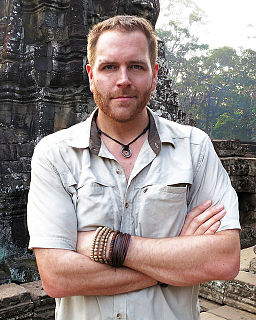A Quote by Bertrand Russell
Can a society in which thought and technique are scientific persist for a long period, as, for example, ancient Egypt persisted, or does it necessarily contain within itself forces which must bring either decay or explosion?
Related Quotes
The technique that only uses explosion or expansion forces is lethal and hostile to the nature. This kind of technique must miss the natural counter force or the organic synthesis which is a negative form of quality - The Organic Vacuum - that reunites the polar and the increasing to the favour of the uprising of a new life form.
It may be that a free society... carries in itself the forces of its own destruction, that once freedom has been achieved it is taken for granted and ceases to be valued, and that the free growth of ideas which is the essence of a free society will bring about the destruction of the foundations on which it depends.
We hear a lot about theological justifications for the conflicts, but very little about the scientific evidence, which in no way supports them. The time period in which Moses was leading his people out of Egypt, into the Promised Land, the Promised Land was Egypt. We know that. Archaeological records are very clear. The Egyptians were avid bureaucrats even in those days and kept very scrupulous records. I think it's important for us to realize this conflict is built on a legend. It has no scientific support.
Remember that [scientific thought] is the guide of action; that the truth which it arrives at is not that which we can ideally contemplate without error, but that which we may act upon without fear; and you cannot fail to see that scientific thought is not an accompaniment or condition of human progress, but human progress itself.
Thought is the creative power, or the impelling force which causes the creative power to act; thinking in a Certain Way will bring riches to you, but you must not rely upon thought alone, paying no attention to personal action. That is the rock upon which many otherwise scientific metaphysical thinkers meet shipwreck–the failure to connect thought with personal action.
If complex organisms demand an explanation, so does a complex designer. And it's no solution to raise the theologian's plea that God (or the Intelligent Designer) is simply immune to the normal demands of scientific explanation. To do so would be to shoot yourself in the foot. You cannot have it both ways. Either ID belongs in the science classroom, in which case it must submit to the discipline required of a scientific hypothesis. Or it does not, in which case, get it out of the science classroom and send it back to church, where it belongs.
What an abyss of uncertainty, whenever the mind feels overtaken by itself; when it, the seeker, is at the same time the dark region through which it must go seeking and where all its equipment will avail it nothing. Seek? More than that: create. It is face to face with something which does not yet exist, which it alone can make actual, which it alone can bring into the light of day.


































